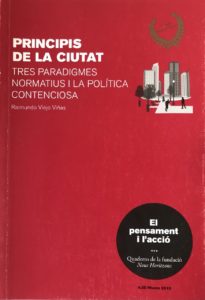Jul
12
[ en ] From liberal democracy to liberal kleptocracy
- POSTED BY Mundus IN Sin categoría
I am pleased to read in today’s papers about a pair of kleptocrats who have found themselves obliged to resign. They have done so exactly the way they normally do: purely on account of the imminent uncovering of criminal liability. It is a positive piece of news, no doubt; but not in the liberal reading if it, which never goes far enough.
In keeping with liberal argumentation, the regime we live in operates in a satisfactory manner. Perhaps it throws up certain problems (corruption cases, slowness in the justice system etc.), but these always take place, at any rate, within the guarantees conferred upon the regime in force (so called liberal democracy) by virtue of being the least bad of all actually existing regimes and even of those known throughout history.
However, as is usually the case with the authoritarianism of any hegemony headed for its own implosion, the tendency to confuse what it is with all that it can be ends up imposing itself liberal ideology. This defect, by the way, is reinforced by liberal epistemology itself (from Popper onward) and the well-known and fallacious argument by subterfuge about the impossibility of verification deduced from falsificationism. And thus liberal democracy, as is known, ends up more liberal than democratic; more marketising than democratising; a notion that presents itself through an inexhaustible source of paradoxes.
Ultimately, the extended liberal axiom that assumes democracy and market to be compatible is nothing more than a ‘vital lie’ (Lebenslüge). Or if one prefers, a cock and bull story that is told under democracy in order to survive and not be obliged to recognised the concessions liberalism has had to make to democratisation.
Isolated cases?
Though the mass media might present it as such, it is not true that behind each kleptocrat is merely an individual case of corruption. And if political science has any purpose for democratic society, its obligation ought precisely to be to go beyond accepting indicators such as corruption as merely anecdotes about greater or lesser delinquents who ‘conveniently’ take advantage of what is public (lo público). It should come as no surprise, at this point, that liberalism ends up finding the perfect excuse for continuing with its liquidation of what is public at the hands of market forces. This is known as a self-fulfilling prophecy and is nothing more than another form of superstition that political science would do well to eradicate.
If the resignation of the kleptocrat is presented in the society of the spectacle as an isolated case of corruption, this is precisely so that no-one may reflect on what is really happening behind the oxymoron of ‘liberal democracy’ in which it takes place. The ultimate media endgame is that the public at large (and also the smaller and more informed university publics) lacks the possibility of understanding the functioning of the entire regime of power that the (neo)liberals are gradually establishing.
Functional Corruption
The matter of corruption and the function it serves to liberal democracy is not, however, difficult to understand. It is something very similar to what happens with fascism, which is part and parcel of the regime (of liberal kleptocracy) that is being established.
Indeed, presented in the media in an isolated manner, the victims of far right organisations are merely isolated cases (today a migrant, tomorrow a gay man, the following day a young activist…always matters for the pages reporting events that never make their way across the prophylactic border with ‘high politics’). However, considered as a whole, we can observe a broad countermovement that is scarcely spoken of in the media, but which for all that does not diminish its spine-chilling weight. If each right-wing crime is presented to us in such a way, this is not by coincidence, or out of ignorance, but because there exists an inherently autocratic biopolitical conception of governance at the heart of liberalism, which reveals itself time and again to be incompatible with democracy.
The same thing happens with corruption. The way in which it is treated in the media (and this includes liberal political science which takes part in the spectacle with its auctoritas) does not seek to put an end to it, but to place it in the service of the power regime that rules us. Media treatment of corruption is, in itself, corrupt. Not legally, of course, but in political terms of a logic alien to democracy (though consistent with liberalism).
Deconstituent process versus constituent process
Kleptocracy is a regime of power that has been under gradual establishment for some time now; sometimes with greater impunity, other times less so; on some occasions transgressing legal limits, on others simply by raising bills for electricity, education, medicine, etc. Kleptocracy is a regime and its agency is made up, in an exclusive and excluding manner, by luminaries and parties. The former by fighting for institutional power resources in the service of networks that pressurise for privatisation, that is, to deprive some (the 99%) of what is given to others (the 1%). After all, its own signifier indicates it: priva(tiza)r *
Against the gradual establishing of kleptocracy, the multitude has rebelled, demanding real democracy. It could not do otherwise, bearing in mind that its regime is absolute democracy and engulfing the frame of liberal democracy, in the manner of the 15-M, is inevitable for it. Hence whoever thinks that this tendency can be reversed by promoting promoting certain luminaries via a left wing party with a view to conquering power within the frame of liberal democracy ought to study the question more seriously and ask if the problem is rather in his or her own fidelity to the party idea and to the kleptocratic regime of which this type of organisation is today, among us, its main agency.
The tawdry example of Izquierda Unida in Andalucía (with the obscene placement of family members in key institutional positions on the part of the luminaries in power) illustrates how not to do things these days. It is a crass error to believe that voting on access of an elite to power is a mode of democratic participation. As always, this will only be possible on the horizon of the politics of movement, in its radical exclusion of every form of corruption, in its destruction of the kleptocracy that they are now seeking to impose.
* [‘Privatizar’ is the Spanish for the verb to privatize. Privar means to deprive. Thus the writer is highlighting the fact that both words have the same action in common]


